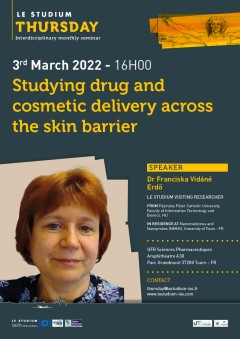Studying drug and cosmetic delivery across the skin barrier
UFR Sciences Pharmaceutiques - Amphi A30
Parc Grandmont
37200 TOURS
France
Presentation
The skin is the largest organ of the body (its surface is ~1.5-1.8 m2 and the weight is about 10 kg for adult humans). It makes a physiological barrier between the organisation and the environment. It should protect the body against chemicals and microbial infections and also mechanical and thermal insults, moreover maintain the homeostasis of the body. It also plays a crucial role in elimination of non-necessary substances on its surface (sweating). The dermal barrier provides a sufficient platform for application of different drugs and different cosmetic formulations against various pathological dermatological conditions, for beauty or against aging. Furthermore, several drugs can be applied on the skin surface with distant targets (e.g. hormones, drugs for central nervous system disorders, painkillers, or even substances against smoking). There are new drug formulations like patches, gels, liposomes, nanoformulations and the traditional creams, ointments, solutions, suspensions etc. The topical route of drug delivery has many advantages: e.g. it has no side effects on the gastrointestinal tract, no fast liver metabolism, long-lasting, consistent penetration, non-invasive treatment, easy application etc.
To study the efficiency of drug administration and penetration through the dermal barrier different techniques are available. The traditional methods are the Franz diffusion cell systems or the transdermal microdialysis techniques, but our current study is focused on the miniaturized version of the diffusion chambers, the so called skin-on-a-chip microfuidic device. The other novel approach for the investigation of drug delivery and the structural compositions of the skin is RAMAN spectroscopy technology which can be performed in vivo in humans or animals and ex vivo in skin samples or skin substituents as well. This talk will present the novel methods and some drug penetration results on healthy and diseased (psoriatic) skins using caffeine as a model drug. Caffeine is widely used in cosmetics and hygenic products and is also an ingredient of complex drug-compostions.
Admission on presentation of the health pass.
Speaker
LE STUDIUM Visiting Researcher
FROM: Pázmány Péter Catholic University, Faculty of Information Technology and Bionics, HU
IN RESIDENCE AT: Nanomedicines and Nanoprobes (NMNS), University of Tours - FR





